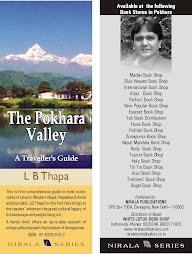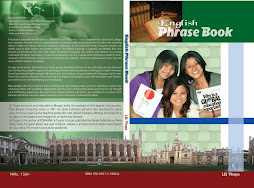Gandhi Raj Kafle
LB Thapa who has been writing in English is one of Nepal’s recent time’s authors. Prior to this, he was a teacher. But, he quit it to boost his writing career as a freelance author. Now, it seems, he is much diversified. He contributes articles to many prominent newspapers and magazines. And, freshly, with the publication of the book of Gems of Nepali Literature, he has three book sin his credit. The Quest of Dead man, a novel, which Thapa has promised to launch soon, also delivers good news to his readers.
In this backdrop, the book under review can be regarded as one of the fresh publications. Yet, the author is humble because he does not like any glorification of his writing. Even for the Gems of Nepali Literature, he says it is neither a research work nor a critic’s analysis on Nepal’s literary luminaries, whose contributions to the Nepali literature is important beyond words. But, the book has both the merits of critical analysis and research. To especially those, who are non Nepali speakers and interested to acquire knowledge in literature of this language; this publication will be an interesting reading material.
The book contains eighteen biographical essays. The first one is on pioneer poet Bhanubhakta. The other prominent litterateurs whose biographies figure here are Motiram Bhatta, Chakrapani Chalise, Lekha Nath Paudel, Dharanidhar Koirala, Mahananda Sapkota, Paras Mani Pradhan, Bala Krishna Sama, Laxmi Prasad Devkota, Bhim Nidhi Tiwari, Siddhi Charan Shrestha, Gopal Prasad Rimal, Madhav Prasad Ghimire, Lainsingh Bangdel, Parijat, Dharma Raj Thapa, Hari Devi Koirala and Ali Miya. These figures are certainly gems of our literature as claimed by the author.
A few words, however, need to be added about Pokhara. The author seems to have special love for this place. That’s why he has written on the significance of Pokhara’s literary tradition in the sixteenth essay of the book before covering biographies of ‘Jana Kavi’ Dharma Raj Thapa, Hari Devi Koirala and Ali Miya
Though the book does not cover any noted litterateurs of the fresh time, the prominent litterateurs whose personalities have been covered here provide invaluable knowledge about not only the life history of these figures, but it also helps to know some important literary tradition of the country. In fact, it is they who shaped Nepali literature, nurtured it with their all might and achieved a claimable success to put this faculty of human knowledge into the era of modern development.
But, it does not mean that the author has shown any indifference to write about these honourable litterateurs’ important events. In fact, he has tried his best to give more and more details about them. The language, the author has used is simple. It is, in fact, a book which covers literary personalities of longer time. In this vein, this is also helpful to know the literary history’s many ups and downs, which our litterateurs faced during their writing career. In essence, author LB Thapa deserves congratulation for publishing such a nice reading material in English.
LB Thapa who has been writing in English is one of Nepal’s recent time’s authors. Prior to this, he was a teacher. But, he quit it to boost his writing career as a freelance author. Now, it seems, he is much diversified. He contributes articles to many prominent newspapers and magazines. And, freshly, with the publication of the book of Gems of Nepali Literature, he has three book sin his credit. The Quest of Dead man, a novel, which Thapa has promised to launch soon, also delivers good news to his readers.

In this backdrop, the book under review can be regarded as one of the fresh publications. Yet, the author is humble because he does not like any glorification of his writing. Even for the Gems of Nepali Literature, he says it is neither a research work nor a critic’s analysis on Nepal’s literary luminaries, whose contributions to the Nepali literature is important beyond words. But, the book has both the merits of critical analysis and research. To especially those, who are non Nepali speakers and interested to acquire knowledge in literature of this language; this publication will be an interesting reading material.
The book contains eighteen biographical essays. The first one is on pioneer poet Bhanubhakta. The other prominent litterateurs whose biographies figure here are Motiram Bhatta, Chakrapani Chalise, Lekha Nath Paudel, Dharanidhar Koirala, Mahananda Sapkota, Paras Mani Pradhan, Bala Krishna Sama, Laxmi Prasad Devkota, Bhim Nidhi Tiwari, Siddhi Charan Shrestha, Gopal Prasad Rimal, Madhav Prasad Ghimire, Lainsingh Bangdel, Parijat, Dharma Raj Thapa, Hari Devi Koirala and Ali Miya. These figures are certainly gems of our literature as claimed by the author.
A few words, however, need to be added about Pokhara. The author seems to have special love for this place. That’s why he has written on the significance of Pokhara’s literary tradition in the sixteenth essay of the book before covering biographies of ‘Jana Kavi’ Dharma Raj Thapa, Hari Devi Koirala and Ali Miya
Though the book does not cover any noted litterateurs of the fresh time, the prominent litterateurs whose personalities have been covered here provide invaluable knowledge about not only the life history of these figures, but it also helps to know some important literary tradition of the country. In fact, it is they who shaped Nepali literature, nurtured it with their all might and achieved a claimable success to put this faculty of human knowledge into the era of modern development.
But, it does not mean that the author has shown any indifference to write about these honourable litterateurs’ important events. In fact, he has tried his best to give more and more details about them. The language, the author has used is simple. It is, in fact, a book which covers literary personalities of longer time. In this vein, this is also helpful to know the literary history’s many ups and downs, which our litterateurs faced during their writing career. In essence, author LB Thapa deserves congratulation for publishing such a nice reading material in English.
(Credit: This article was originally published in The Rising Nepal by Gandhi Raj Kafle)









No comments:
Post a Comment